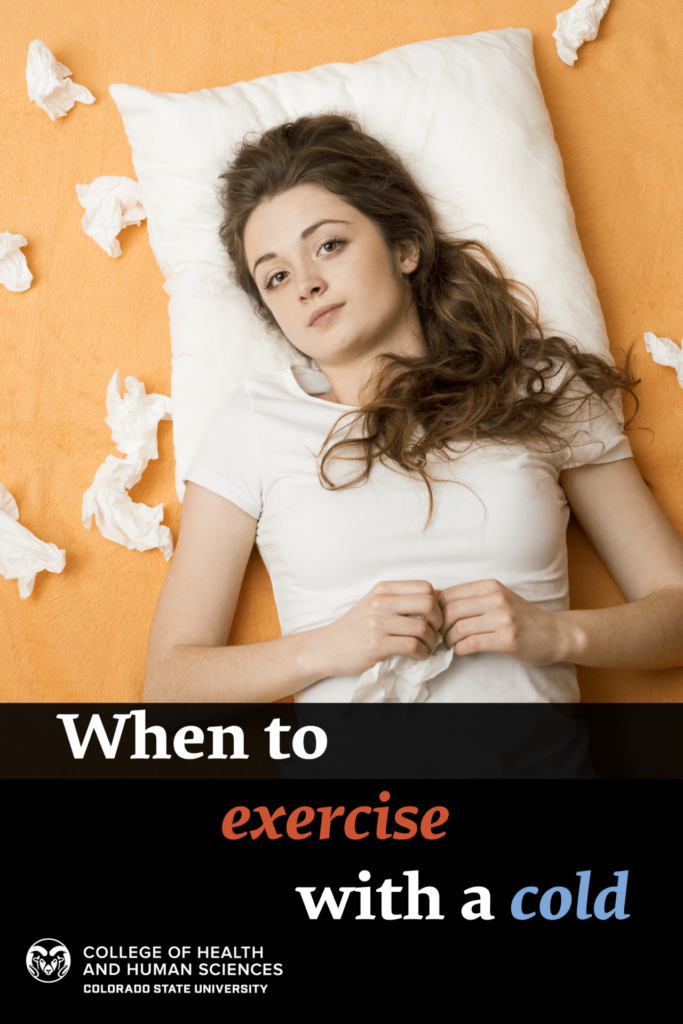 The common cold is almost inevitable during our lifetime, and it regularly occurs every cold and flu season. There are some who believe exercise will prevent colds from happening in the first place, or at least make it less severe. Others think exercising during a cold can make it worse. So what are we to believe?
The common cold is almost inevitable during our lifetime, and it regularly occurs every cold and flu season. There are some who believe exercise will prevent colds from happening in the first place, or at least make it less severe. Others think exercising during a cold can make it worse. So what are we to believe?
The best advice is to listen to your body, but there are some general guides for if, and when, to exercise when dealing with a cold or illness.
-
‘Above the neck’
A good guideline to remember is that exercise is generally considered okay to participate in when symptoms are “above the neck”. This means if your symptoms are in the head-region, like a runny nose, congestion, sneezing, and/or a minor sore throat. It might be a good time to opt for a decrease in intensity, so not going as long or hard as you would on a normal day, or lifting lighter weight at fewer sets and reps than usual. Exercise may help to open congested nasal passages, which can provide some temporary relief and make you feel better.
-
‘Below the neck’
When a cold or illness starts to impact “below the neck,” it might be best to skip a day, or even a few days. When symptoms start to impact the chest-region, such as coughing, muscle aching, upset stomach, and overall fatigue, a few days off shouldn’t dramatically change performance. When ready to return to exercise, start your return gradually. Use your body as your guide, and when you’re feeling miserable, don’t push it.
-
Fevers
It is not recommended to exercise with a fever. Exercise can increase your overall, or core, body temperature. Exercising with a fever can increase the length of time to return to your normal (pre-exercise) body temperature, and too high of a body temperature can have negative consequences for the kidneys and other organs. If you have a fever and are likely dealing with a virus or illness, the best remedy may be plenty of rest. Take that time off and recover.
-
Avoid the gym or workout classes
This is for your fellow patrons, as well as your own health. Use the guide above to pick if you should or shouldn’t exercise, but be mindful of where you do exercise should you decide you can. Should you choose to exercise, consider it at home or on your own. Contact with exercise equipment that others regularly touch can leave traces of the germs or infections for hours, meaning you can come into contact with other illnesses while your body is already dealing with one illness, or that you can leave your illness behind for others to catch. Spare others, and yourself, in cold and flu season.
Regular exercise habits can promote immune system strength, likely decreasing the number of colds you have or the severity of the illness when you have it. However, each individual person should evaluate for themselves if they are up to exercise when they are sick. If concerned, or if the cold is lasting longer than usual, always check in with your doctor. Exercising if it is beyond the minor cold could lead to further illness or injury.
Kimberly Burke is the director of the Adult Fitness Program at Colorado State University, an outreach program through the Department of Health and Exercise Science. Adult Fitness offers exercise opportunities for employees of CSU as well as community members, while providing hands-on learning experiences for health promotion students. To learn more see the Adult Fitness website.